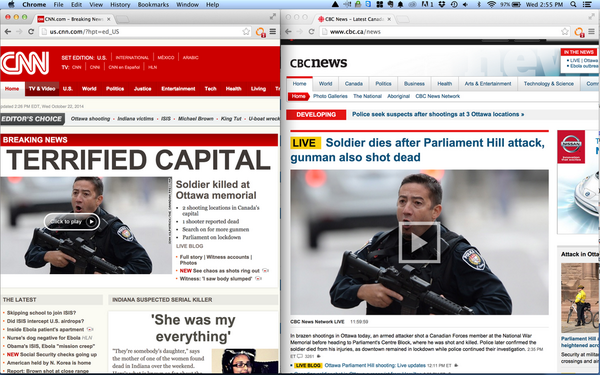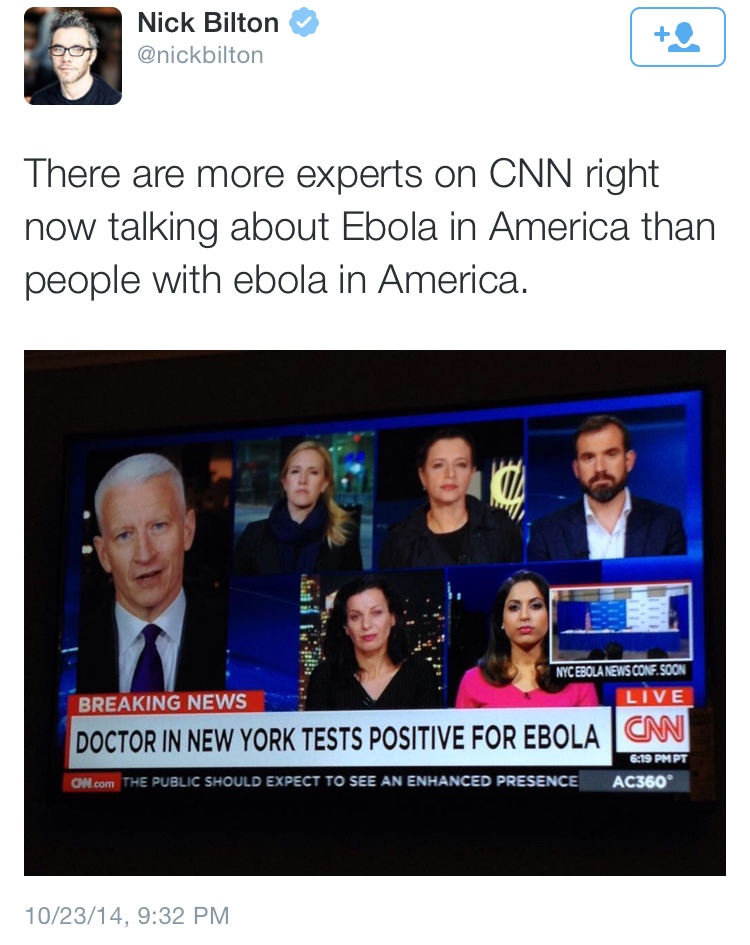Over on Google+ today, Chris Sewell posted as an image of a tweet from New York Times columnist Nick Bilton. Nine days ago I wrote about fear, not contagion, being the real threat Ebola poses. Nick’s point is scary itself. Happy Halloween to you, too.
For the supposedly freest country in the world, fear enslaves America, and the news media helps forge the chains. How stupid is that? In the past 12 hours, I have seen two people in my neighborhood wearing full-face masks—the fleshy colored material used to wrap up an injured knee. The masks covered from below chin to eyes. That’s the culture of fear.
This week’s shooting nearby Ottawa’s Parliament Building spotlights blatant problems with American news reporting. That’s the point Gene Chiu made yesterday in a comment directed to me: “It is interesting to see the difference in how Canadian and American news shows cover the shooting in Ottawa”.
I asked: “Can you be specific? You got my interest”. He linked to a tweet from The Daily Beast reporter Scott Bixby, whose little pic comparing CNN and CBC home pages is revealing. Look closely at the CNN and CBC page headlines. “Terrified Capital” isn’t just sensational and fear-mongering but makes a generalized assumption about every Ottawan’s state of mind.
After I posed the question to Gene and before he responded, a newscast made the contrast clear to mw. On the radio, I heard an American journalist interview a print reporter from Ottawa. The questions were nearly all leading, seeking to drive answers to terrorism. The Canadian, to his credit, was cautious, emphasizing that the government’s investigation had only just started and that there was too little information to draw conclusions.

The tenor is important. The Ottawa journalist isn’t a spokesperson for the Canadian government, so he was right to resist being lead down a path to comment about terrorism. The American’s questions begged for sensation, which could create unnecessary fear here or across the border about further attacks and preempt a thorough investigation by, if nothing else, putting political pressure on the professionals in charge.
I am dismayed by sensationalism that is particularly common among U.S. broadcast news organizations. Responsible reporters don’t ask leading questions, which presume what the story is or seek specific response. Reporting should always lead the story, wherever it goes. You may think you know what is the story, and you the news gatherer may be right. But you don’t get there by asking one, or in the case of yesterday’s broadcast, a series of questions seeking single response.
There’s a big difference aggressively questioning a hostile subject versus, in this instance, asking a knowledgable peer to share from his or her on-site experience based on actual news reporting.
Regarding tech, I often write sensational headlines and provocative news analyses meant to get people to think. In questioning analysts I sometimes will include my hypothesis and see the approach as being different than leading them somewhere.
Sensation seeks soundbites. “Mr. Johnson, why does your chocolate kill babies in Africa?” “Our chocolate doesn’t kill babies in Africa”. Gotcha. Soundbite. The denial has nothing to do with with accuracy or responsible reporting. But it has everything to do with creating fear.
